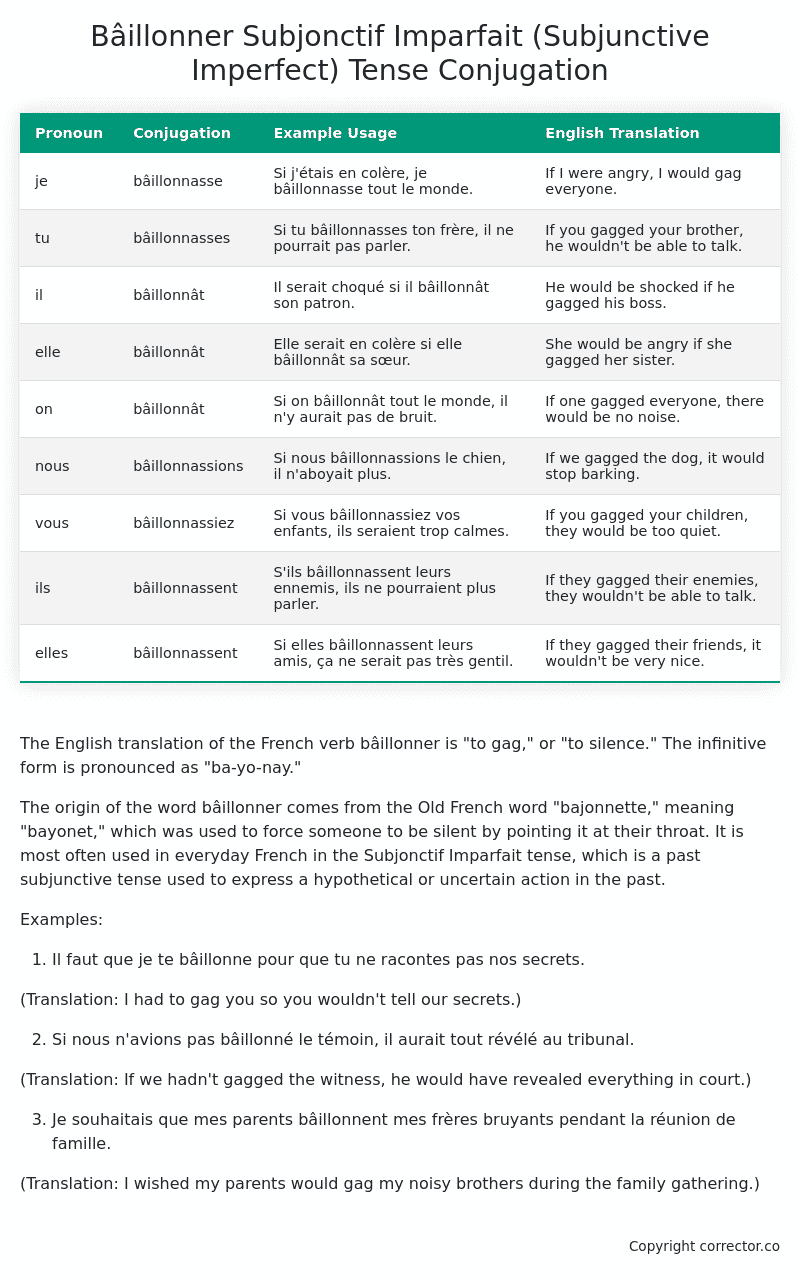Subjonctif Imparfait (Subjunctive Imperfect) Tense Conjugation of the French Verb bâillonner
Introduction to the verb bâillonner
The English translation of the French verb bâillonner is “to gag,” or “to silence.” The infinitive form is pronounced as “ba-yo-nay.”
The origin of the word bâillonner comes from the Old French word “bajonnette,” meaning “bayonet,” which was used to force someone to be silent by pointing it at their throat. It is most often used in everyday French in the Subjonctif Imparfait tense, which is a past subjunctive tense used to express a hypothetical or uncertain action in the past.
Examples:
- Il faut que je te bâillonne pour que tu ne racontes pas nos secrets.
(Translation: I had to gag you so you wouldn’t tell our secrets.)
- Si nous n’avions pas bâillonné le témoin, il aurait tout révélé au tribunal.
(Translation: If we hadn’t gagged the witness, he would have revealed everything in court.)
- Je souhaitais que mes parents bâillonnent mes frères bruyants pendant la réunion de famille.
(Translation: I wished my parents would gag my noisy brothers during the family gathering.)
Table of the Subjonctif Imparfait (Subjunctive Imperfect) Tense Conjugation of bâillonner
| Pronoun | Conjugation | Example Usage | English Translation |
|---|---|---|---|
| je | bâillonnasse | Si j’étais en colère, je bâillonnasse tout le monde. | If I were angry, I would gag everyone. |
| tu | bâillonnasses | Si tu bâillonnasses ton frère, il ne pourrait pas parler. | If you gagged your brother, he wouldn’t be able to talk. |
| il | bâillonnât | Il serait choqué si il bâillonnât son patron. | He would be shocked if he gagged his boss. |
| elle | bâillonnât | Elle serait en colère si elle bâillonnât sa sœur. | She would be angry if she gagged her sister. |
| on | bâillonnât | Si on bâillonnât tout le monde, il n’y aurait pas de bruit. | If one gagged everyone, there would be no noise. |
| nous | bâillonnassions | Si nous bâillonnassions le chien, il n’aboyait plus. | If we gagged the dog, it would stop barking. |
| vous | bâillonnassiez | Si vous bâillonnassiez vos enfants, ils seraient trop calmes. | If you gagged your children, they would be too quiet. |
| ils | bâillonnassent | S’ils bâillonnassent leurs ennemis, ils ne pourraient plus parler. | If they gagged their enemies, they wouldn’t be able to talk. |
| elles | bâillonnassent | Si elles bâillonnassent leurs amis, ça ne serait pas très gentil. | If they gagged their friends, it wouldn’t be very nice. |
Other Conjugations for Bâillonner.
Le Present (Present Tense) Conjugation of the French Verb bâillonner
Imparfait (Imperfect) Tense Conjugation of the French Verb bâillonner
Passé Simple (Simple Past) Tense Conjugation of the French Verb bâillonner
Passé Composé (Present Perfect) Tense Conjugation of the French Verb bâillonner
Futur Simple (Simple Future) Tense Conjugation of the French Verb bâillonner
Futur Proche (Near Future) Tense Conjugation of the French Verb bâillonner
Plus-que-parfait (Pluperfect) Tense Conjugation of the French Verb bâillonner
Passé Antérieur (Past Anterior) Tense Conjugation of the French Verb bâillonner
Futur Antérieur (Future Anterior) Tense Conjugation of the French Verb bâillonner
Subjonctif Présent (Subjunctive Present) Tense Conjugation of the French Verb bâillonner
Subjonctif Passé (Subjunctive Past) Tense Conjugation of the French Verb bâillonner
Subjonctif Imparfait (Subjunctive Imperfect) Tense Conjugation of the French Verb bâillonner (this article)
Subjonctif Plus-que-parfait (Subjunctive Pluperfect) Tense Conjugation of the French Verb bâillonner
Conditionnel Présent (Conditional Present) Tense Conjugation of the French Verb bâillonner
Conditionnel Passé (Conditional Past) Tense Conjugation of the French Verb bâillonner
L’impératif Présent (Imperative Present) Tense Conjugation of the French Verb bâillonner
L’infinitif Présent (Infinitive Present) Tense Conjugation of the French Verb bâillonner
Struggling with French verbs or the language in general? Why not use our free French Grammar Checker – no registration required!
Get a FREE Download Study Sheet of this Conjugation 🔥
Simply right click the image below, click “save image” and get your free reference for the bâillonner Subjonctif Imparfait tense conjugation!

Bâillonner – About the French Subjonctif Imparfait (Subjunctive Imperfect) Tense
Formation
Common Everyday Usage Patterns
Interactions with Other Tenses
Subjonctif Présent
Indicatif Passé Composé
Conditional
Conditional Perfect
Summary
I hope you enjoyed this article on the verb bâillonner. Still in a learning mood? Check out another TOTALLY random French verb conjugation!


